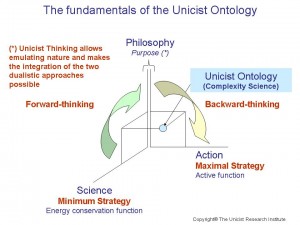 The Unicist Ontology erased the barriers between action, science and philosophy giving birth to the ontology based research of complex adaptive systems.
The Unicist Ontology erased the barriers between action, science and philosophy giving birth to the ontology based research of complex adaptive systems.
In Life Sciences: Development of the functional structure that regulates evolution and the development of the structure of living beings as a unified field.
In Research: Development of a methodology for complex and adaptive systems research.
In Philosophy: Discovery of the unicist ontology and refutation of Hegel’s dialectic theory, as a particular case, and the formulation of the laws of the double dialectic.
In Social Sciences: Discovery of cross-cultural “invariables” and their laws of evolution.
In Future Research and Strategy: Modeling of the ontological structure in the individual, institutional and social fields that allows inferring the evolution.
In Education: Discovery of the ontology of learning which has given scientific sustainability, amongst others, to Piaget.
In Anthropology: Discovery of the “invariables” of human behavior.
In Mathematics: Development of the conceptual basis of dependence, interdependence, independence of variables.
In Economic Science: Discovery of the structure of the ontology of Economics. Development of the ontological structure of Economic Schools and their functionality.
In Political Science: Development of the ontological basis of ideologies and their functionality.
In Cognitive Science: Development of a methodology to construct knowledge and knowledge objects with existing information through an integrative logic.
In History: Development of a historical analysis methodology based on the Unicist dialectic (double dialectic).
In Logic: Development and formalization of the integrative unicist logic, sustention for the unified fields’ theory in evolution.
In Psychology: Discovery of the ontology and evolution laws of human essential complexes (Inferiority/Superiority – Oedipus)
